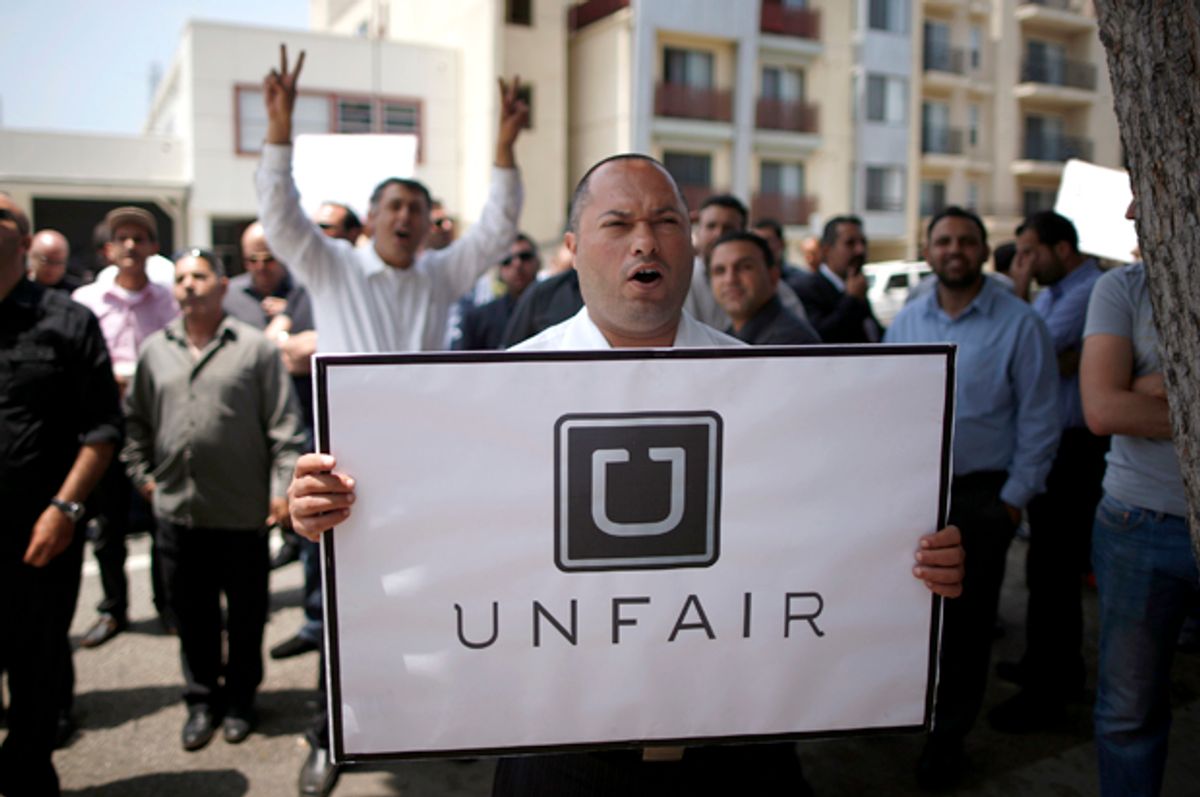So here’s a story you don’t read very often anymore, certainly not in the United States.
A red-hot and impossibly well-funded corporation — one with extensive ties to the powers that be not only on Wall Street but also in Silicon Valley — recently tried to strong-arm its way into a major market. It did so despite the fact that its business model was, in many respects, incompatible with that market’s predominant government regulations and social norms. The plan, I guess, was to “disrupt.”
If you’re someone who pays attention to the business press, or lives in a big city, then you’ve probably already guessed that I’m talking about Uber. You’re probably already aware of its market valuation — currently a gobsmacking $62.5 billion — and you’re probably already familiar with the company’s preferred means of market penetration. You’ve probably heard tales before of its smash-and-grab ethos, its fondness for ignoring the law and daring overmatched regulators to do something about it.
Remember, though, that I said this is a story you don’t hear very often. This one hasn’t ended like all the others (at least not yet). Because in this example, Uber did something different. Yes, it swooped in, it broke the rules, it ignored local customs and traditions. But then it did what it had almost never done before, what many people on Wall Street and in Silicon Valley thought it couldn’t do. It picked a fight — and it lost.
There’s no other way to describe the company’s recent decision to all but give up on getting a foothold in Germany, at least for the time being. It’s hard to imagine Uber permanently giving up on Europe’s biggest economy, of course. But according to a report in The New York Times, Uber’s problem goes well beyond Germany’s borders. Deutschland is just one of many places where Uber’s struggling — and it’s almost always for the same reason.
And what is that reason? If I had to describe it generally, I’d say it’s the result of a basic error the folks running Uber keep making. Namely, they think other Western democracies will be just as willing to sacrifice its values and bend to the market as we are here in the United States. Check out, for example, the Times’ description of how Uber tried (or rather didn’t try) to acclimate itself to its new would-be home:
In early November, Uber shut its small office in Frankfurt’s centuries-old city center after just 18 months of operation, mothballing the online platform that had let people in the city hail rides through a smartphone app. The pullback was spurred in part by drivers like Hasan Kurt, the owner of a local licensed taxi business, who had refused to work with the American service.
With more than 20 years of experience as a taxi operator, Mr. Kurt said he disliked how Uber barreled into Frankfurt in early 2014, using primarily unlicensed drivers who had not passed the same exams and health checks required of licensed drivers. That low-cost service, UberPop, which is similar to UberX in the United States, faced legal challenges and was eventually outlawed, last March, by German regulators.
Eventually, the Times says, Uber agreed, however grudgingly and belatedly, to play by Germany’s rules. That’s that, right? That’s certainly what the kind of free-market absolutists who adore Uber would be inclined to think. The service is good; so whether or not they think the company’s owners act like a bunch of jerks, they’ll eventually hop aboard. It’s what any rational actor would do! It’s what countless people in San Francisco are doing right now!
Not really, it turns out. “It’s not part of the German culture” to act as Uber did, said Hasan Kurt, a Frankfurt driver and licensed taxi service owner, to the Times. “We don’t like it, the government doesn’t like it, and our customers don’t like it.” A professor at Germany’s Otto Beisheim School of Management, meanwhile, told the paper that “If you want to be successful in Germany, you have to understand the regulation.” Uber didn’t, he said, and it paid the price.
And this wasn’t just the response of Uber’s obviously biased competitors, like Kurt, either. The Times found one financial analyst who liked the service because he appreciated the ability to pay for rides with his smartphone. But when he saw reports of Uber ignoring not only social norms between businesses, but orders from German courts, he decided he’d had enough. “That might work in the U.S.,” he said, “but that’s not how things are done here in Germany. Everyone must respect the rules.”
It’s a fascinating story, to be sure. But it’s more than that. Because what Uber’s experience in Germany (and elsewhere in Europe) reveals is a truth that tends to be either rejected or ignored by most elites in America. Which, simply put, is this: While market forces do have a logic and power of their own, they are neither irrefutable nor divine. They can be tamed; they can be thwarted. Other values, like fairness or social cohesion, are sometimes more important.
Neoliberalism is not destiny, in other words. It can be made to bend to the will of the people — no matter what Uber’s friends in Silicon Valley, on Wall Street, and in the halls of government want you to believe.




Shares